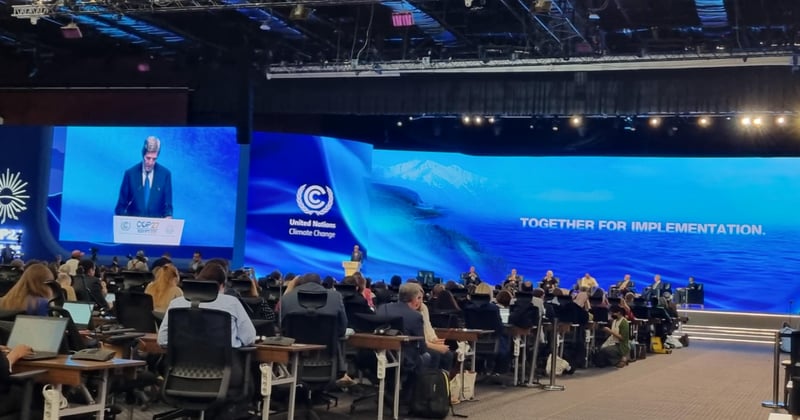
A small win for sustainable food systems but COP27 fails to deliver big changes required to avert climate tipping point
Press release
20 November, Sharm El-Sheikh COP27, Egypt: World Animal Protection welcomes COP27’s recognition of agriculture and food systems as a significant component of climate change action - but warns failure to urgently tackle emissions from industrial livestock farming will make it impossible to halt and reverse global warming.
The UN climate talks headed by Egypt concluded early Sunday, with agreements on a range of complex issues, including a hard-fought fight by civil society for a loss and damage fund – which will become historic if fully implemented.
Disappointingly, no further progress was made on the phase out of fossil fuels and attempts by negotiators to agree on how to keep the 2015 Paris Agreement limiting global warming to 1.5C fell well short.
World Animal Protection has been at COP27 throughout, calling on countries to commit to transition to sustainable food systems alongside shifts to plant-based diets. This is crucial to reducing greenhouse gas emissions.
The final text on agriculture represents a small step forward, recognising the need for sustainable food systems, for climate action in relation to agriculture, and the emphasis on food security.
But the world’s largest agri-food companies linked to widespread destruction of forests and contributing significantly to emissions, promised much but failed to deliver adequate business strategies to align with the 1.5C climate target.
World Animal Protection’s Director of External Engagement, Kelly Dent - who is attending COP27 - said:
One bright spot in these crucial but otherwise frustrating climate negotiations has been the strong demand of civil society to include food systems in the debate through the presence of several food pavilions, numerous side events and a dedicated Agriculture Day putting food systems well and truly on the radar of the world leaders charged with saving our planet.
The momentum for the inclusion of agriculture and food systems in future discussions is now irreversible, though much more needs to be done to move it where it needs to be – near the top of the agenda.
A number of new countries did sign the methane pledge. But this commitment doesn’t cover the biggest sectoral source of methane emissions - livestock farming.
Without bold action, even if fossil fuel emissions were eliminated immediately, emissions from the global food system alone would make it impossible to limit warming to 1.5°C.
Added Dent: “This is a concern because it gives big meat producers carte blanche to continue to destroy and clear natural habitat for factory farmed animal feed crops.
And though high emitting companies such as JBS committed to the agriculture sector roadmap - but they did not, as demanded by civil society and activists, come clean on the true levels of their emissions and the impact of their deforestation.
Distributed to delegates at COP27, World Animal Protection’s Climate Change and Cruelty report showed higher welfare farming for pigs emitted less methane. The report also revealed the true extent of unsustainable deforestation caused by factory farming. When deforestation to grow feed crops – especially soya - for global trade is considered, this doubles the overall climate change impact of factory farmed meat in EU member the Netherlands alone.
Note to editors:
- For interviews with World Animal Protection spokespersons at COP27 about the contact Global Media Manager Peter Simpson: Email petersimpson@worldanimalprotectoion.org Twitter @petersimpson66 Tel: +44 (0) 7803 051 844
Facts from the report the Climate Change and Cruelty Report:
- The 4 biggest factory farming markets of the world are China, Brazil, US and Europe.
- Meat consumption rates in 2020 for the four-factory farming hot spots are already high. Europeans consume around 33kg of pork per person per year and 23kg of chicken. Brazilians eat 41kg of chicken and 12kg of pork each year, US people eat 23kg of pork and 50kg of chicken and in China, pork is the most consumed meat, with 26kg per person and 14kg of chicken.
- The climate impacts of factory farmed chicken alone in these factories farming hot spots is the equivalent of driving almost 29 million cars for a year.
- Animal feed production is the dominant contributor to factory farming’s climate impact.
- A million kilograms of factory farmed chicken need almost 4.3 million square metres of land dedicated to animal feed, while a million kilograms of factory farmed pork needs around 5.8 million square metres of land dedicated to animal feed. That’s around the size of 672-906 football fields which is an area that can accommodate up to 1.45 million trees.
- For every 100 calories of crops fed to farmed animals, only 17-30 calories end up feeding people2. Meat and dairy provide only 18% of overall calories and 37% of protein for humans, but they use 83% of farmland3. It is far better to grow crops that feed humans directly through mostly plant-based diets.
- Methane from the manure of factory farmed pigs accounts for 21% of overall pork emissions for Netherlands, 22% for US, and 24% for Brazil.
- By 2040, China’s per person annual consumption of chicken is expected to have increased from current levels to 15kg and pork to 31kg. Increases in chicken consumption are also expected in Brazil, US and Organisation for Economic Co-operation and Development (OECD)4 countries at 43kg, 53kg and 25kg respectively. For pork, consumption may reach 13kg for Brazil, 24kg for the US and 32kg for OECD countries.
- Increases in pork and chicken consumption will result in notable increases in climate and environmental impacts.
- Conversely, reducing pork per person by 50% by 2040 would result in a 41% decrease in climate change impacts from pork consumption in China, 54% for the EU, 44% for Brazil and 43% for the US13.